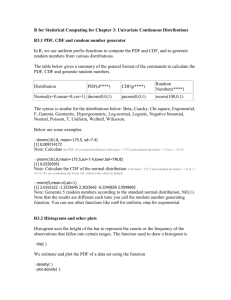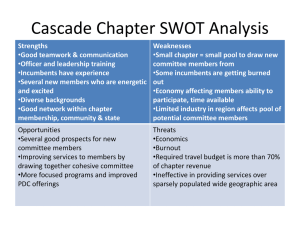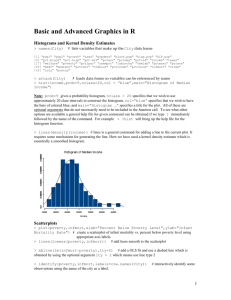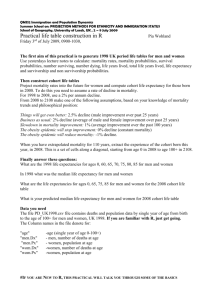Sample of Xlab Protocol - University of California, Berkeley
advertisement
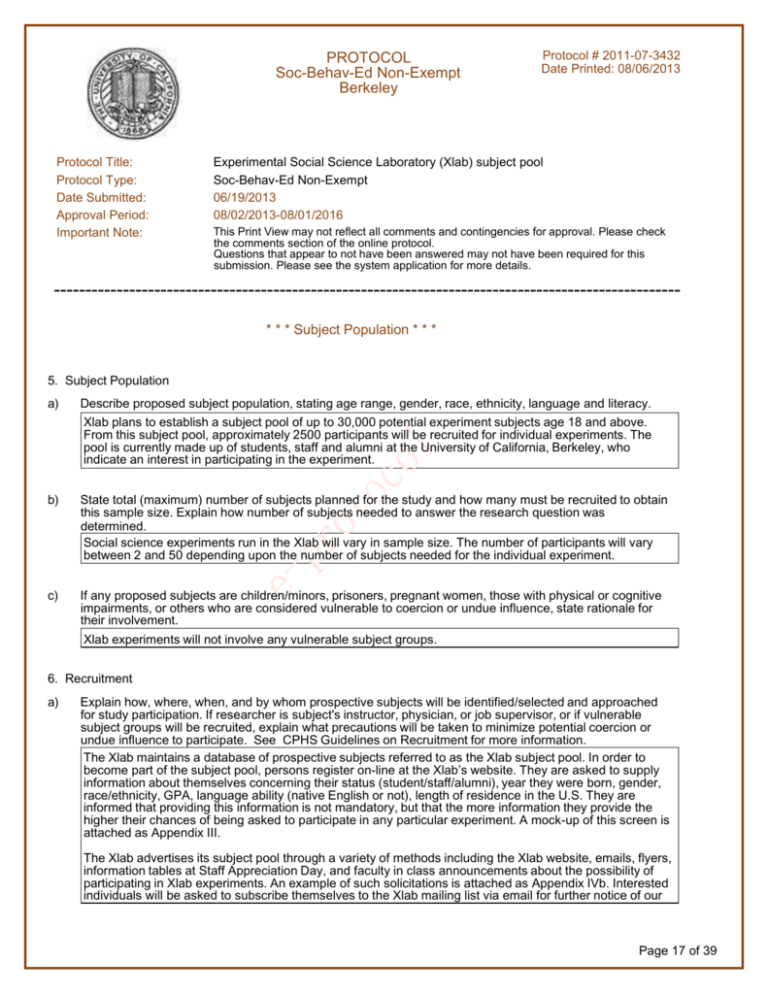
PROTOCOL Soc-Behav-Ed Non-Exempt Berkeley Protocol Title: Protocol Type: Date Submitted: Approval Period: Important Note: Protocol # 2011-07-3432 Date Printed: 08/06/2013 Experimental Social Science Laboratory (Xlab) subject pool Soc-Behav-Ed Non-Exempt 06/19/2013 08/02/2013-08/01/2016 This Print View may not reflect all comments and contingencies for approval. Please check the comments section of the online protocol. Questions that appear to not have been answered may not have been required for this submission. Please see the system application for more details. ---------------------------------------------------------------------------------------------------17 * * * Subject Population * * * 5. Subject Population a) Describe proposed subject population, stating age range, gender, race, ethnicity, language and literacy. Xlab plans to establish a subject pool of up to 30,000 potential experiment subjects age 18 and above. From this subject pool, approximately 2500 participants will be recruited for individual experiments. The pool is currently made up of students, staff and alumni at the University of California, Berkeley, who indicate an interest in participating in the experiment. b) State total (maximum) number of subjects planned for the study and how many must be recruited to obtain this sample size. Explain how number of subjects needed to answer the research question was determined. Social science experiments run in the Xlab will vary in sample size. The number of participants will vary between 2 and 50 depending upon the number of subjects needed for the individual experiment. c) If any proposed subjects are children/minors, prisoners, pregnant women, those with physical or cognitive impairments, or others who are considered vulnerable to coercion or undue influence, state rationale for their involvement. Xlab experiments will not involve any vulnerable subject groups. 6. Recruitment a) Explain how, where, when, and by whom prospective subjects will be identified/selected and approached for study participation. If researcher is subject's instructor, physician, or job supervisor, or if vulnerable subject groups will be recruited, explain what precautions will be taken to minimize potential coercion or undue influence to participate. See CPHS Guidelines on Recruitment for more information. The Xlab maintains a database of prospective subjects referred to as the Xlab subject pool. In order to become part of the subject pool, persons register on‐line at the Xlab’s website. They are asked to supply information about themselves concerning their status (student/staff/alumni), year they were born, gender, race/ethnicity, GPA, language ability (native English or not), length of residence in the U.S. They are informed that providing this information is not mandatory, but that the more information they provide the higher their chances of being asked to participate in any particular experiment. A mock‐up of this screen is attached as Appendix III. The Xlab advertises its subject pool through a variety of methods including the Xlab website, emails, flyers, information tables at Staff Appreciation Day, and faculty in class announcements about the possibility of participating in Xlab experiments. An example of such solicitations is attached as Appendix IVb. Interested individuals will be asked to subscribe themselves to the Xlab mailing list via email for further notice of our Page 17 of 39 PROTOCOL Soc-Behav-Ed Non-Exempt Berkeley Protocol Title: Protocol Type: Date Submitted: Approval Period: Important Note: Protocol # 2011-07-3432 Date Printed: 08/06/2013 Experimental Social Science Laboratory (Xlab) subject pool Soc-Behav-Ed Non-Exempt 06/19/2013 08/02/2013-08/01/2016 This Print View may not reflect all comments and contingencies for approval. Please check the comments section of the online protocol. Questions that appear to not have been answered may not have been required for this submission. Please see the system application for more details. ---------------------------------------------------------------------------------------------------18 experiments. The on‐line subject recruitment system is managed on a secure site by Sona Systems under contract from the Xlab. Sona Systems performs this service for several other university‐based experimental laboratories and has appropriate safeguards for guaranteeing the security of all information collected. Persons already in the subject pool will be solicited for specific experiments through e‐mails sent by the Xlab staff, stating that subjects can sign up for a particular experiment at a given time(s), and that those who participate in the experiment will earn some average hourly payment (typically, $15 per hour), or some combination of cash, electronic gift code and/or goods (e.g., coffee mugs). An example of such solicitations is attached as Appendix IVa. b) Describe any recruitment materials (e.g., letters, flyers, advertisements [note type of media/where posted], scripts for verbal recruitment, etc.) and letter of permission/cooperation from institutions, agencies or organizations where off-site subject recruitment will take place (e.g., another UC campus, clinic, school district). Attach these documents in Attachments section. Sample recruitment materials are attached as Appendices IVa and IVb. All recruitment materials for individual Xlab experiments must be included with the individual application. c) Will anyone who will be recruiting or enrolling human subjects for this research receive compensation for each subject enrolled into this protocol? If yes, please identify the individual(s) and the amount of payment (per subject and total). No 7. Screening a) Provide criteria for subject inclusion and exclusion. If any inclusion/exclusion criteria are based on gender, race, or ethnicity, explain rationale for restrictions. Screening could be based on age, gender, race/ethnicity, GPA, language ability (native English or not), length of residence in the U.S. for experiments in economics, psychology, statistics, etc. All volunteers for particular experiments will be accepted up until a fixed number of slots per experimental session is filled on a first‐come first‐serve basis. When recruitment is done via a volunteer email list, we will simply invite only those subjects’ who meet the necessary criteria – if there are any – to participate in a study. If screening is done in the Haas Business School's subject pool (reference CPHS approval #2005‐ 11‐42 OBIR subject pool and #2007‐8‐6 Marketing subject pool.), it must comply with procedures specified in the protocol approved for that experiment. All screening data on non‐enrollees will be destroyed and no records will be kept by the researcher. Persons registering for the Xlab subject pool supply identifying information. It is used only by the Xlab for the purposes of paying the subjects. Identifying information is stored in a private network managed by Page 18 of 39 PROTOCOL Soc-Behav-Ed Non-Exempt Berkeley Protocol Title: Protocol Type: Date Submitted: Approval Period: Important Note: Protocol # 2011-07-3432 Date Printed: 08/06/2013 Experimental Social Science Laboratory (Xlab) subject pool Soc-Behav-Ed Non-Exempt 06/19/2013 08/02/2013-08/01/2016 This Print View may not reflect all comments and contingencies for approval. Please check the comments section of the online protocol. Questions that appear to not have been answered may not have been required for this submission. Please see the system application for more details. ---------------------------------------------------------------------------------------------------19 Sona Systems and is accessible only by the Xlab staff. b) If prospective subjects will be screened via tests, interviews, etc., prior to entry into the "main" study, explain how, where, when, and by whom screening will be done. NOTE: Consent must be obtained for screening procedures as well as "main" study procedures. As appropriate, either: 1) create a separate "Screening Consent Form;" or 2) include screening information within the consent form for the main study. N/A 8. Compensation and Costs a) Describe plan for compensation of subjects. If no compensation will be provided, this should be stated. If subjects will be compensated for their participation, explain in detail about the amount and methods/ terms of payment. Include any provisions for partial payment if subject withdraws before study is complete. When subjects are required to provide Social Security Number in order to be paid, this data must be collected separately from consent documentation. If applicable, describe security measures that will be used to protect subject confidentiality. If non-monetary compensation (e.g., course credit, services) will be offered, explain how Xlab policy is that investigators must pay a "show‐up" fee of at least $5 (five) to subjects who arrive on time for an experiment but, for some reason beyond the subjects’ control (too many subjects, experiment cancelled, etc), do not get to participate in the experiment. As indicated in the Consent Form, subjects who begin, but withdraw from, an experiment will not receive any compensation (course credit, incentive payment, or show‐up fee). To be considered as having arrived “on time,” subjects must check in at least fifteen minutes prior to the start of an experiment. Experimenters are required to set compensation rates for subjects participating in their experiments. In economics experiments, a typical average compensation rate is at least $15 (fifteen) per hour of lab time. It is Xlab policy that a $15 (fifteen) participation fee be paid to subjects in experiments that are begun but cannot be completed due to technical or other difficulties. In some experiments, payments will be flat rates (e.g., $15/hour) for participation. In others, subjects will receive variable payments based on their choices, responses, or decisions during an experiment. Subjects will be paid at the conclusion of the experiment/group activity/survey/interview by check or by cash. Page 19 of 39 PROTOCOL Soc-Behav-Ed Non-Exempt Berkeley Protocol Title: Protocol Type: Date Submitted: Approval Period: Important Note: Protocol # 2011-07-3432 Date Printed: 08/06/2013 Experimental Social Science Laboratory (Xlab) subject pool Soc-Behav-Ed Non-Exempt 06/19/2013 08/02/2013-08/01/2016 This Print View may not reflect all comments and contingencies for approval. Please check the comments section of the online protocol. Questions that appear to not have been answered may not have been required for this submission. Please see the system application for more details. ---------------------------------------------------------------------------------------------------20 Payouts to participants will normally not exceed $40/hr, and participants will never be in the position of owing money to the experimenter. For online experiments conducted in remote locations, payments to participants will be made within 48‐ hours of completion of the experiment. Payment will be by Amazon Electronic Gift Codes and the codes will be sent in an email or subjects will be required to go to a secured website to claim their electronic gift code. Reference Appendix VII, the sample EGC (electronic gift code) email. Information about any potential payments to be earned or issued for participation in individual experiments as well as course credit for participation will be included in all consent forms. Not all subjects will necessarily be paid. Some may be given only course credit if they were recruited from one of the classroom subject pools. b) Discuss reasoning behind amount/method/terms of compensation, including appropriateness of compensation for the study population and avoiding undue influence to participate. Modest payments are a standard feature of experiments listed in Appendix III. Differential incentives, essentially based on performance relative to others in the experiment is an essential feature of such experiments, as they focus subjects’ attention and keep them from attempting to game the experiment. c) Costs to Subjects. If applicable, describe any costs/charges which subjects or their insurance carriers will be expected to pay. (If there are no costs to subjects or their insurers, this should be stated.) None. --------------------------------------------------------------------------------------------- Page 20 of 39 PROTOCOL Soc-Behav-Ed Non-Exempt Berkeley Protocol Title: Protocol Type: Date Submitted: Approval Period: Important Note: Protocol # 2011-07-3432 Date Printed: 08/06/2013 Experimental Social Science Laboratory (Xlab) subject pool Soc-Behav-Ed Non-Exempt 06/19/2013 08/02/2013-08/01/2016 This Print View may not reflect all comments and contingencies for approval. Please check the comments section of the online protocol. Questions that appear to not have been answered may not have been required for this submission. Please see the system application for more details. ---------------------------------------------------------------------------------------------------23 * * * Risks and Discomforts * * * 11. Risks and Discomforts a) Describe all known risks and discomforts associated with study procedures, whether physical, psychological, economic or social (e.g., pain, stress, invasion of privacy, breach of confidentiality), noting the likelihood and degree of potential harm. All experiments conducted at the Xlab will be of minimal risk to participants. The primary risk is the possibility of mild dissatisfaction with one’s performance or concerns about information that may have been withheld. Based on past experience with similar experiments, this risk is exceedingly low and full debriefing will be provided when appropriate. b) Discuss measures that will be taken to minimize risks and discomforts to subjects. Subjects are always given the option to leave the experiment at any time. When appropriate, debriefing information will be provided and subjects will be given the option to disallow use of their data. c) Discuss plans for reporting unanticipated problems involving risks to subjects or others, or serious adverse events, to CPHS. (This applies to all types of research.) See Adverse Event and Unanticipated Problem Reporting. As Xlab studies never involve more than minimal risk, the possibility of unanticipated problems or adverse events is negligible. Negative outcomes will generally be managed on the spot by the individual investigator and the Xlab staff assisting with the experiment. Problems not amenable to immediate resolution are referred to the Xlab Manager and, ultimately, to the Xlab Director. Any unanticipated problem or serious adverse event (as defined in CPHS Policies & Procedures) will be reported by the Xlab Director to the Director of the Office for Protection of Human Subjects as soon as possible, but within no more than one week (seven calendar days) of the Lead Investigator learning of the incident. d) Describe plans for provision of treatment for study-related injuries, and how costs of injury treatment will be covered. If the study involves more than minimal risk, indicate that the researchers are familiar with and will follow University of California policy in this regard, and will use recommended wording on any consent forms (see CPHS Informed Consent Guidelines). Xlab studies never involve more than minimal risk. --------------------------------------------------------------------------------------------Page 23 of 39 PROTOCOL Soc-Behav-Ed Non-Exempt Berkeley Protocol Title: Protocol Type: Date Submitted: Approval Period: Important Note: Protocol # 2011-07-3432 Date Printed: 08/06/2013 Experimental Social Science Laboratory (Xlab) subject pool Soc-Behav-Ed Non-Exempt 06/19/2013 08/02/2013-08/01/2016 This Print View may not reflect all comments and contingencies for approval. Please check the comments section of the online protocol. Questions that appear to not have been answered may not have been required for this submission. Please see the system application for more details. ---------------------------------------------------------------------------------------------------24 * * * Benefits, Confidentiality * * * 12. Benefits Describe any potential benefits to the individual subject, group of subjects, and/or society. If subjects will not benefit directly from study procedures, this should be stated. NOTE: Do not include compensation/payment of subjects in this section, as remuneration is not considered a "benefit" of participation in research. There are no direct benefits to the subjects from participation in Xlab experiments. The hope is that information obtained will benefit society in general, with the experiments designed to test various theories of economic and social behavior. 13. Confidentiality NOTE: See CPHS Data Security Policy and CPHS Data Security Matrix before completing this section. a) Explain how subject privacy will be protected and how confidentiality of subject information will be maintained. Discuss who will have access to study records/specimens and how the records will be secured. When studies are conducted in the Xlab, subjects will be assigned subject numbers, which will be used to record all data. Any records associating subject numbers with subject names will be locked in a secure place by the principal investigator in charge of each experiment, or by the Xlab administrators – depending on each individual study design for identifiable or coded data collection. The list of subject names and subject numbers will be stored separately from any coded data. All data will be stored in a secure, locked location. When researchers chose to run their experiment outside of the Xlab room and the Xlab staff is not available to provide administrative services. researchers will ask participants to provide their name and UC student/staff ID numbers for the purpose of signing in participants and collecting payment receipts. At the end of the experiment, the sign‐in sheet and payment receipts collected will be submitted by the researcher for reimbursement. Once the sign in list and payment receipts are submitted for reimbursement, the researcher will no longer have access to the personal information of the participants. The collection of personal information is sometimes necessary to allow researchers the flexibility to run their experiment elsewhere. Page 24 of 39 PROTOCOL Soc-Behav-Ed Non-Exempt Berkeley Protocol Title: Protocol Type: Date Submitted: Approval Period: Important Note: Protocol # 2011-07-3432 Date Printed: 08/06/2013 Experimental Social Science Laboratory (Xlab) subject pool Soc-Behav-Ed Non-Exempt 06/19/2013 08/02/2013-08/01/2016 This Print View may not reflect all comments and contingencies for approval. Please check the comments section of the online protocol. Questions that appear to not have been answered may not have been required for this submission. Please see the system application for more details. ---------------------------------------------------------------------------------------------------25 Each individual protocol submitted where a researcher chooses to personally run the experiment should include a description of how the data will be collected anonymously and not connected to the personal identification collected for the purposes of issuing payment. In team experiments, group members may know the identity of the other participating subjects. In all cases, the individuals involved will be asked to maintain strict confidentiality of others responses in the group session. Names or other identifying information of participants will not be used in any final reports of the research without prior written consent from the individual. An additional signature line for use of identifying or for direct quotation in final reports will be included in the consent form when applicable. b) Will subjects be asked to give permission for release of identifiable data (e.g., information, videotapes), now or in future? If so, explain here and include appropriate statements in consent materials. Yes for some studies. See attached Appendix IVc Consent Form. c) Will data be collected anonymously (i.e., no identifying information from subjects will be collected/ recorded that can be linked to the study data)? Data is not anonymous if there is a code linking it to personally identifiable information. Also, audio and video recordings are generally not considered to be anonymous unless distinguishing features can be successfully masked. No, in most cases data will not be collected anonymously. d) If using existing data/biological specimens, will the researchers have access to a code linking the data to personally identifiable information? N/A e) If identifying information will be collected and linked to data/specimens, explain at what stage identifiers will be removed from the data/specimens. If identifiers will be retained, explain why this is necessary and how confidentiality will be protected. Persons registering for the Xlab subject pool supply identifying information (e.g., student or staff ID number), but such information is not available to individual investigators unless it is specifically indicated on the researcher’s individual protocol. It is used only by the Xlab for the purposes of pre‐screening and is stored in an encrypted private network managed by Sona Systems and is accessible only by the Xlab staff. Subjects recruited for individual experiments will be assigned subject numbers, which will be used to record all data from that experiment. Records associating subject numbers with subject names will be available only to the Xlab staff for purposes of generating subject payments and are stored in a secure unless it is specifically indicated on the researcher’s individual protocol, locked location under control of the Xlab’s data stewards. Page 25 of 39 PROTOCOL Soc-Behav-Ed Non-Exempt Berkeley Protocol Title: Protocol Type: Date Submitted: Approval Period: Important Note: Protocol # 2011-07-3432 Date Printed: 08/06/2013 Experimental Social Science Laboratory (Xlab) subject pool Soc-Behav-Ed Non-Exempt 06/19/2013 08/02/2013-08/01/2016 This Print View may not reflect all comments and contingencies for approval. Please check the comments section of the online protocol. Questions that appear to not have been answered may not have been required for this submission. Please see the system application for more details. ---------------------------------------------------------------------------------------------------26 In most cases, this subject code number will suffice for researcher use and analysis. If researchers will assign any other codes to respondents, this will be specified in each protocol. f) If the data is coded, explain where the key to identifiers will be stored, how it will be protected, and who will have access to it. The key to identifiers is stored on the Sona Systems secure, encrypted private location and is available only to the Xlab’s designated data steward. g) Indicate whether research data/specimens will be destroyed at the end of the study. If data will not be destroyed, explain why, where, in what format, how long it will be retained and who will have access to it. Research data from individual experiments will always be under the control of individual experimenters and will not be kept by the Xlab in any form. All data from Xlab experiments will be devoid of individual identifiers and thus rendered anonymous to the experimenter. Data are likely to be retained by experimenters to facilitate the scientific review and replication processes. h) Explain how data, audiotapes, videotapes, photographs, etc., will be stored and who will have access to them. Indicate at what point they will be transcribed and/or destroyed (if ever). Data collection instruments, audiotapes, videotapes, etc. from individual experiments will always be under the control of individual experimenters and will not be kept by the Xlab in any form. All such instruments from Xlab experiments are likely to be retained by experimenters to facilitate the scientific review and replication processes. Individual protocols will describe plans for data retention and confidentiality measures related to long term storage of study materials. --------------------------------------------------------------------------------------------- Page 26 of 39

